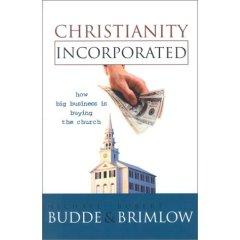Christianity Incorporated: How Big Business is Buying the Church
 by Michael L. Budde & Robert W. Brimlow
by Michael L. Budde & Robert W. Brimlow2002, Brazos Press.
I come from a financially-oriented family. Mom and Dad met while working at the Federal Reserve Bank. My uncle and aunt are entrepreneurs. Grandma still follows the stock market daily. They all told me, "Take Economics in college!" Well, with all the philosophy, German, and Ultimate Frisbee classes filling up my schedule, ECON 10 just didn't fit.
And I regret it. I'm sorry, Family! I should have listened to your advice. I'm gradually discovering how essential economics is to just about everything - including the Kingdom of God. Unfortunately, I'm not alone among Christians who artifically dichotomize the world into economic and spiritual realms.
If Colossians Remixed casts a vision for the church living counterculturally in the face of the global capitalist empire, Christianity Incorporated describes the present reality of a church not only submitting to, but blindly shaking hands with its oppressor. Authors Budde & Brimlow, professors of political science and philosophy, respectively, argue that the church has become a chaplain for capitalism. Much as a military chaplain provides moral support and personal guidance to individual soldiers, but cannot question the values or legitimacy of the military itself, the authors claim that the church has become so engrossed in worldly wealth that it can no longer prophetically challenge the systemic injustices of capitalism.
Furthermore, in its mission of Christian formation - shaping the "habits, affections, and dispositions of people" to be like Christ's - the church cannot compete with the formational processes of capitalism: an endless barrage of advertisements on television, radio, and every other conceiveable medium.
In every time and place, the church has formed a people capable of hearing and responding to the gospel of Jesus, the witness of the saints and martyrs, and the challenges of the prophets.... [But], in the world made by contemporary capitalism, thousands of for-profit firms of considerable wealth and power are vitally concerned with forming human affections, dispositions, desires, and practices. Capitalism, no less than Christianity, depends on formation processes to sustain itself in the world; making people "fit for capitalism" is no less important to the workings of the world economy that processes of production, distribution, and finance.How can the church cast off its chaplaincy role? Like the authors of Colossians Remixed, Budde & Brimlow close their book with an exploration of the alternative economics of the Kingdom, particularly those practices that can be derived from the Sermon on the Mount (Matthew 5-7) and the Old Testament law. For example,
Our primary assertion is this: to the extent that capitalist formation succeeds, Christian formation fails. (61)
By restraining the urge to amass wealth and translate that wealth into domination (the Old Testament more often ascribes wealth accumulation to exploitation and predatory practices than to individual hard work), the Jubilee imperitave [Leviticus 25] testifies to the divine economy as one of abundance rather than scarcity, of communal sufficiency rather than individual acquisition. (161-2)As a campus minister raising financial support, Christianity Incorporated hits close to home. Where do I draw the line between receiving donors' gifts with gratefulness and critiquing the economic system from which many of my supporters derive their income? Where do I draw the line between my own participation in the capitalist economy and its dangerous side effects? I have no easy answers, only more questions and a newfound desire to understand economics - not in order to profit from the system, but in order to live faithfully in spite of it. In a world where everything is for sale, I have good news that can't be bought:
Come, all you who are thirsty,
come to the waters;
and you who have no money,
come, buy and eat!
Come, buy wine and milk
without money and without cost.Why spend money on what is not bread,
and your labor on what does not satisfy?
Listen, listen to me, and eat what is good,
and your soul will delight in the richest of fare. (Isaiah 55:1-2, NIV)

0 Comments:
Post a Comment
<< Home